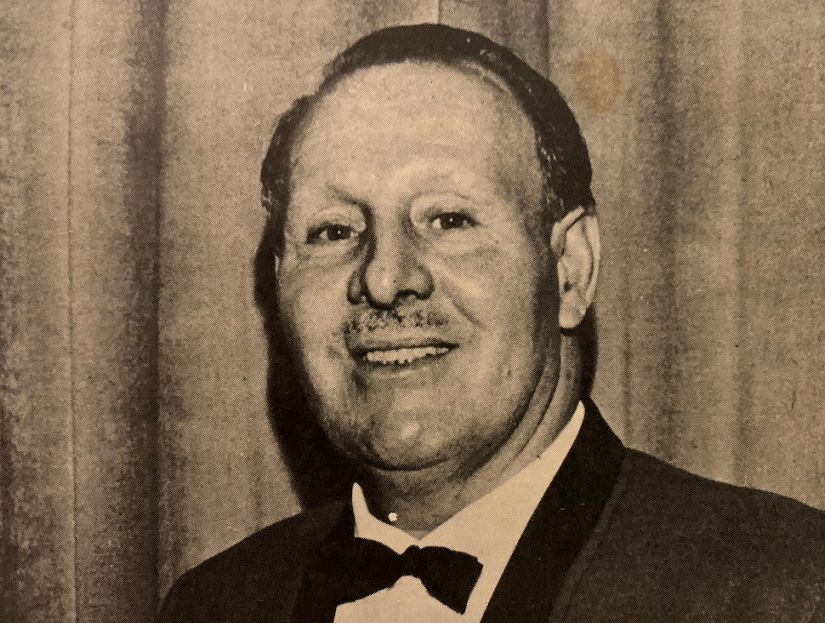
14. George Thompson (1907 – 1984)
For a conductor who sealed his musical reputation with Grimethorpe Colliery Band, George Thompson was forever grateful opportunity meant he was able to turn his back on a working life at the coal face.
It came after he witnessed the hardships of the 1926 General Strike.
Born in the Nottinghamshire village of Bulwell, his was a mining family, whilst his early connection to brass bands came via his local Salvation Army Corps and a fascination with the euphonium.
Despite the stronger appeal of football which he retained throughout his life, his affection was rekindled after leaving school at 14.
Joining the “decent Second Section band” of Huthwaite, his commitment (making a 10 mile round trip on foot to each rehearsal) was peppered by a growing ambition which started to flourish after he joined Kirkby Old Band, where he came across Fred Thorpe, a former solo euphonium at Foden’s.
George Thompson was forever grateful opportunity meant he was able to turn his back on a working life at the coal face.
Thorpe nurtured his talent and on a trip to Crystal Palace he finally got to hear the likes of Foden’s, Black Dyke, St Hilda’s and Wingates.
It added fuel to his determination.
Advert opportunity
Opportunity arose in 1929 when he spotted an advert for an Eb bass player at Callenders Cable Works Band in Kent. Realistic about the scope of his euphonium playing, he applied and was successful.
Crucially it also gave him the chance to broaden his musical horizons; learning harmony, composition and conducting with Professor Easthop, a film score writer and organist.
George also began travelling to London for lessons with Denis Wright (as well as Hubert Bath, George Hawkins and the renowned French Horn teacher Eddie Chapman) whom he had first met at the Crystal Palace contest, and in 1933 became the first recipient of the LGSM (Brass Bandmastership) diploma. Sir Granville Bantock took an interest in his work.
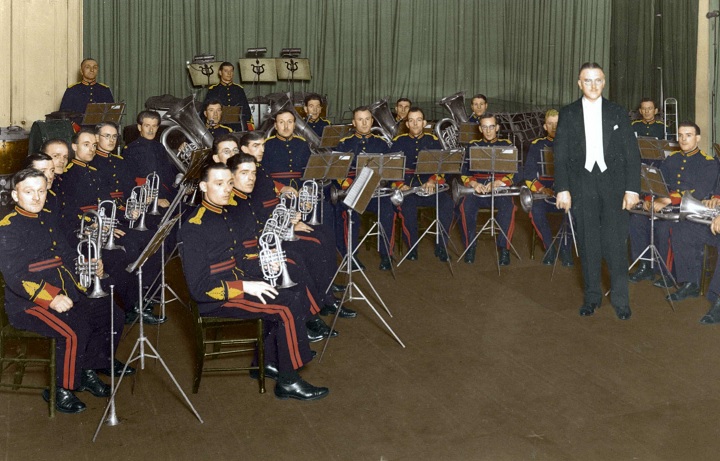
George Thompson (on tuba to the left of the MD) at Callenders in 1930
He left Callenders in 1937 and conducted the newly formed Odhams Press Band which printed the iconic ‘Horse & Hound’ magazine.
According to George the band only had two members who could actually play; the rest - “fellows in pin-stripe suits and hard hats” walked up Fleet Street in London to daily ‘rehearsals’ to be taught basic rudiments.
Years later, that short period (he soon moved on to Northfleet Silver) was to prove crucial in setting up Grimethorpe Schoolboys Band in 1942.
According to George the band only had two members who could actually play; the rest - “fellows in pin-stripe suits and hard hats” walked up Fleet Street in London to daily ‘rehearsals’ to be taught basic rudiments.
Pacifist
At the outbreak of the Second World War, George thought about joining the RAF Central Band. He was, as he readily admitted, “a bit of a pacifist” who “didn’t see the sense in war”, but still felt could contribute musically.
Instead, opportunity once again intervened and took him to the recently formed City of Coventry Band where he helped in the production of Bofor guns. He stayed at six months.
Despite the increase in bombings on the city “nobody ever missed a practice”, the result of which saw George lead them to fifth place at a depleted 1940 September Belle Vue contest (with a young James Scott on cornet).
Suspicious
George though realised that opportunity had once again played its part, as the test-piece, ‘Clive of India’ was a crude rehash of a previous work by composer Joseph Holbrook that he had played with Callenders Work.
He later recalled; “I knew we were in with a chance. I used to do a lot of research into the historical background of pieces. After that I became a bit suspicious of the research business.”
In the audience that day was the manager at Grimethorpe Colliery, who had failed to make an impression of the judges.
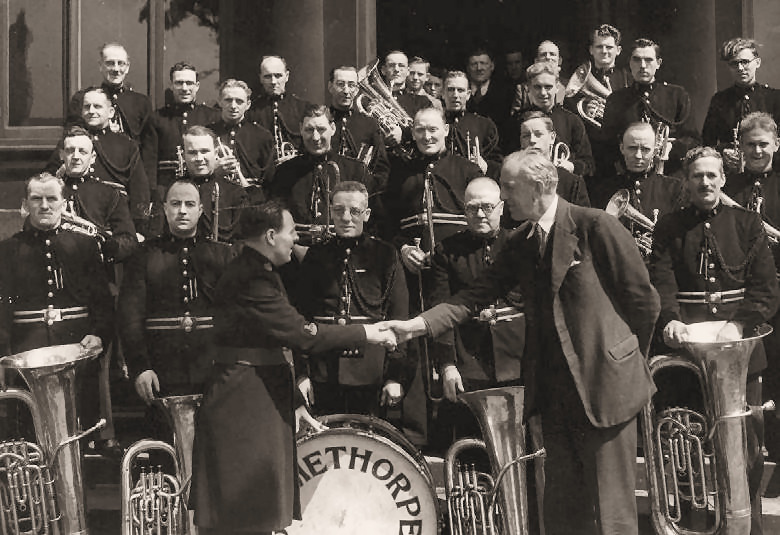
Welcome to Grimethorpe: Thomspn led the band to second place at the 1945 British Open
Keen to make a mark against fellow pit bands such winners Bickershaw, he approached the 35 year old Thompson to become professional conductor.
Although it would mean a return to an industry that held little affection, the prospect of a ‘protected’ regular salary and people who would support his ambition, saw George take another opportunity offered.
Foundation
However, in his view Grimethorpe, “wasn’t in good shape, although I could tell that they had been under a good man.” That man was William Halliwell, who had left five years before.
Thompson set about building a foundation - setting up a pioneering ‘Boys Band’ full of local youngsters. With a grant of £50, instruments were secured, and so was its future.
Despite coming runner-up at the 1945 British Open, Grimethorpe was still below the level of other post war bands such as Fairey and Black Dyke, and with Thompson unsure of the future following coal nationalisation in 1947, he took yet another opportunity to seek new horizons.
Although not officially connected to the colliery, Grimethorpe Schoolboys’ Band became a success (winning the Junior National Championships of Great Britain in 1948) - a remarkable feeder stream of talent under different guises for many years to come.
Despite coming runner-up at the 1945 British Open, Grimethorpe was still below the level of other post war bands such as Fairey and Black Dyke, and with Thompson unsure of the future following coal nationalisation in 1947, he took yet another opportunity to seek new horizons.
Freelance success
Over the next decade as a freelance professional he enjoyed considerable success - notably with Hanwell, who he led to second place at the 1950 National Championships as well as Area titles in 1950 and 1953.
Others, such from Creswell Colliery to Wallsend, Gwaun cae Gurwen to John White Footwear also benefitted from his growing renown as a skilled, inspirational conductor; bold, mercurial and confident - a very individual talent honed to a fine point of musical appreciation.
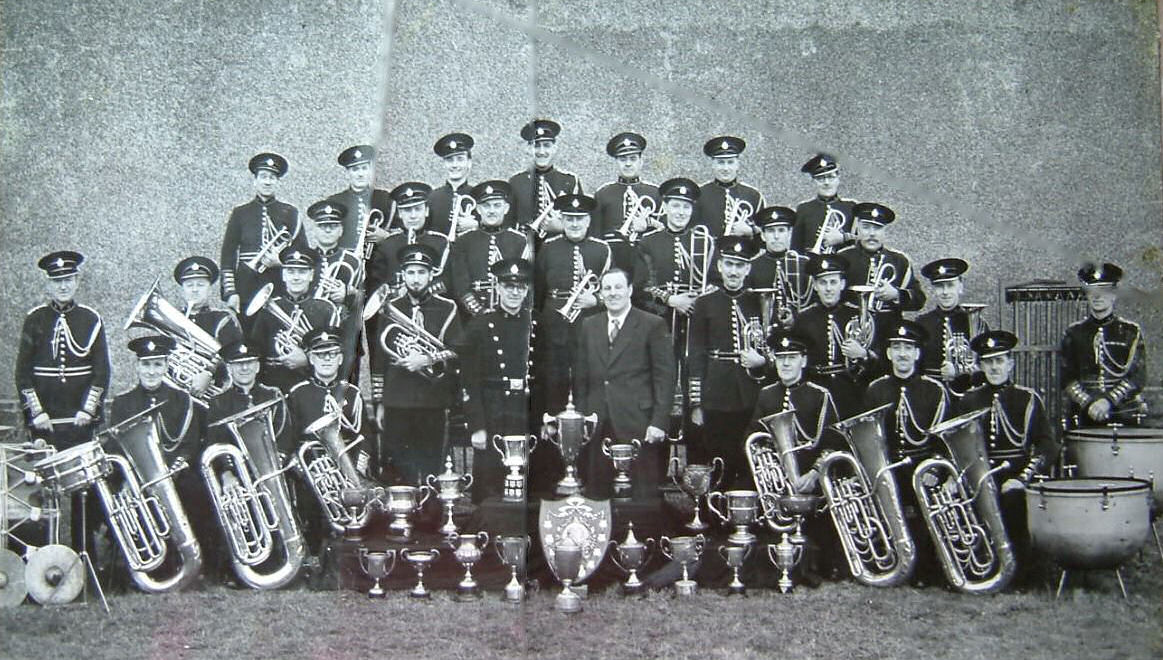
George Thompson enjoyed considerabel success with Hanwell Band
Peripatetic conducting had taken its toll though, and when opportunity once again arose in 1957 he grabbed it by both hands to return to the security offered by Grimethorpe. The youth stream of talent was resurrected with the formation of the Grimethorpe Junior Band - and what talented it unearthed.
After building the band in his musical image, Grimethorpe took the Yorkshire title again in 1967 – a prelude to a season in which they secured the British Open and embarked on the peak years that saw his band play with a rare mix of passion, excitement and daring.
Soon his musical alchemy (one former player called him a ‘wizard’) started to turn base metal into gold – including podium spots at the British Open in 1961 and 1963 bolstered by victories at regional events (including a memorable victory at the 1963 Yorkshire Area).
Whilst he still enjoyed success on his travels, Grimethorpe was his primary focus.
Comedy
After building the band in his musical image, Grimethorpe took the Yorkshire title again in 1967 – a prelude to a season in which they secured the British Open and embarked on the peak years that saw his band play with a rare mix of passion, excitement and daring.
Thompson later recalled that he felt ‘Comedy’ was “brilliant and melodious… a mixture of lyricism, aggressive dynamic rhythms and an expressive use of harmonic colour.” It, “relies on its content rather than a heavy dose of showmanship…”
He had both in equal measure.
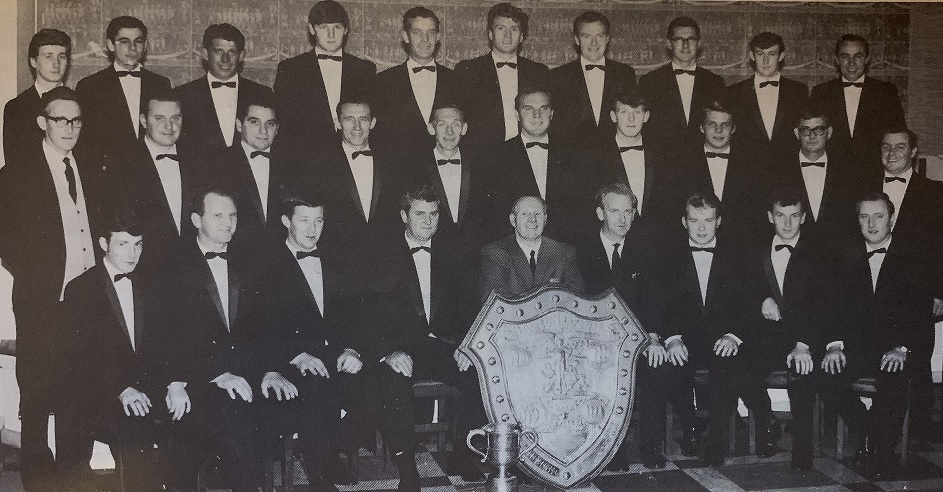
1967 British Open winners
George Thompson worked his mix of youngsters (brought in over the years since his return) and older heads hard, and one member later recalled that whilst “some of us didn’t agree with his action, his judgement was proved to be right”.
And right he was.
The great cornet player Norman Ashcroft later told George that the victory “was long overdue”. He in return felt it was a victory for “the youngest first class band in Great Britain.”
Historic
However, if the 1967 Belle Vue triumph was notable, the 1969 victory on ‘Spectrum’ was historic.
Of the piece he later said that it, “…had a tremendous impact on me. It did present problems, but it had a melody and a meaning behind it all – in spite of little rhythmic difficulties. There was a pattern to the music – a message.”
The judges called Grimethope, “a fine toned band controlled by a fine musician”, displaying playing that, “from the outset was immediately obvious was of a very high order.” They won by a clear two point margin.
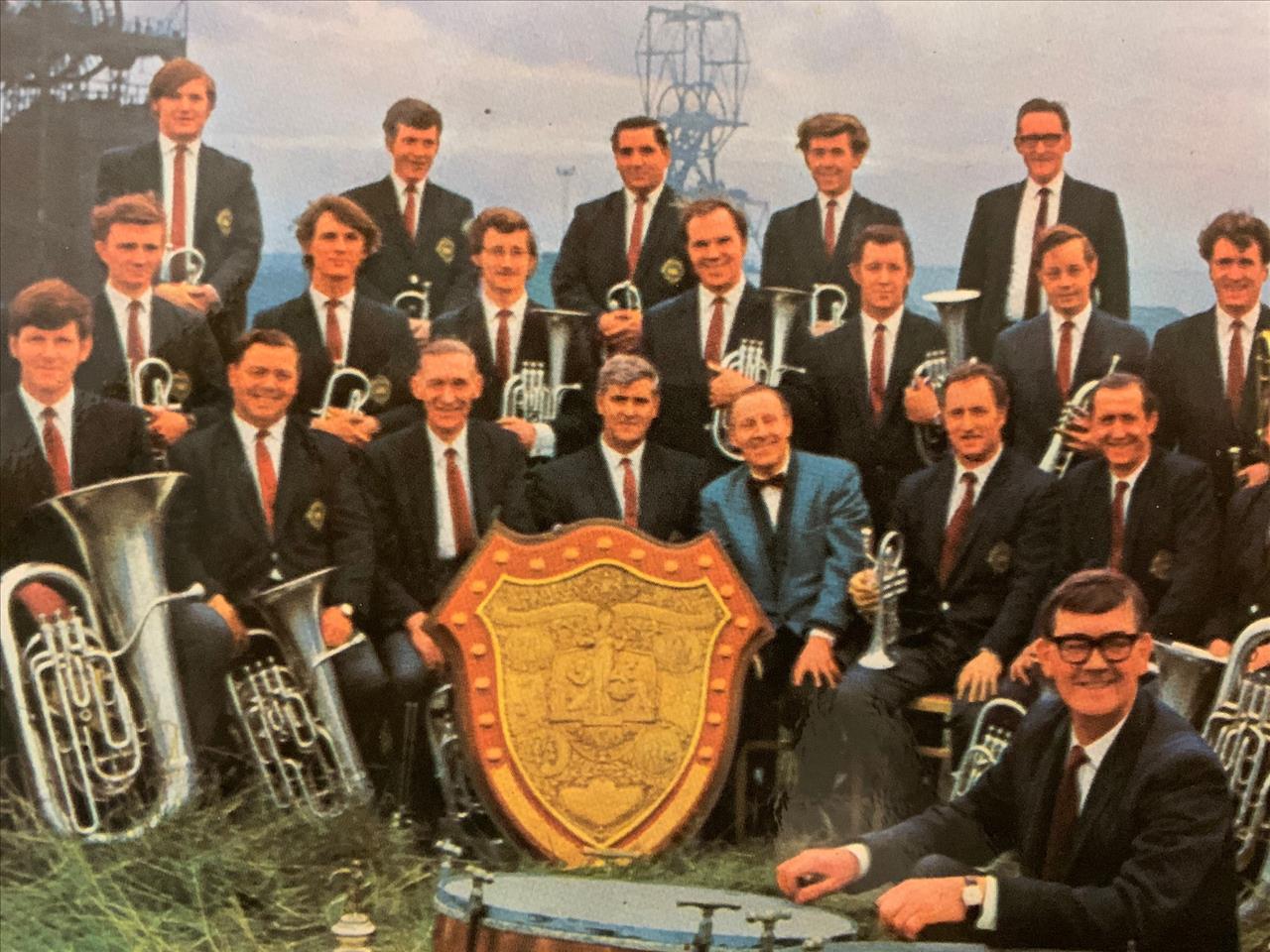
At the centre of the band - 1969 British Open winners
Despite the furore, in a letter in the British Bandsman magazine following the success, George Thompson remarked that the band had been “deeply impressed by the many personal congratulations” that had been received from listeners conductors and bandsmen alike.
In 1970 he led Grimethorpe to the National title – an apt, deserved victory despite the rather denuded line-up of rivals (six top bands played in the separate World Championship): Just a month before at the British Open he was presented with the Iles Medal in recognition of his contribution to the banding movement.
As with the adjudications on the day, it was a mark of the respect that he now engendered.
In 1970 he led Grimethorpe to the National title – an apt, deserved victory despite the rather denuded line-up of rivals (six top bands played in the separate World Championship). Just a month before at the British Open he was presented with the Iles Medal in recognition of his contribution to the banding movement.
Honours
A new and exciting era was now opening up. In 1971 he led Grimethorpe at the first Granada Band of the Year contest (coming runner-up) before on reaching retirement age (65) in 1972 he was obliged to cease his National Coal Board employment with Grimethorpe Colliery.
His last contest after 15 years service was a victory at the CISWO Yorkshire Championships.
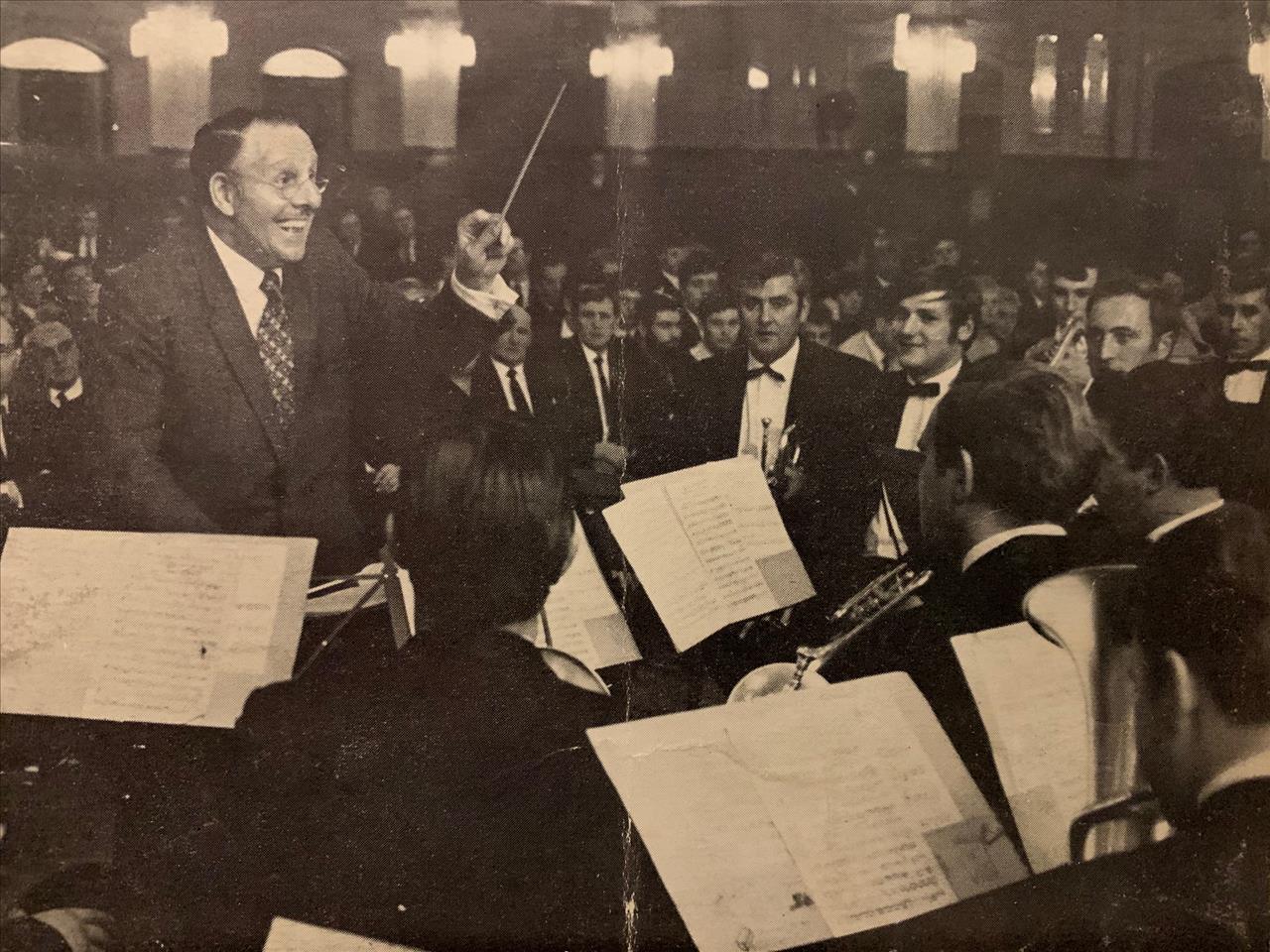
Thompson at the helm with Grimethorpe
Despite suffering a heart attack later that year he went onto enjoy a further freelance success. He was presented with the ‘Baton of Honour’ at the 1973 National Championships of Great Britain, as well as becoming Director of Examinations at the Bandsman’s College of Music in 1975.
In 1978 George Thompson was awarded the MBE for services to brass bands.
Once again a host of bands from Trefor in North Wales (which he enjoyed returning to for the next decade with much success) to CWS Glasgow in Scotland, Ever Ready in the North of England, to Fairey and Besses in the North West and Woodfalls in the West, enjoyed his visits.
Last opportunity
In one last twist of opportunity given that he was longer a National Coal Board employee, George Thompson was also able to work with Grimethorpe up to 1982. His last contest appearance was marked with a second place finish at that year’s Tetley Open.
Always prepared to work a band hard, but with a sense of humour that encouraged players to stretch themselves as musicians, he remained a popular figure as well as a perceptive adjudicator and much underrated arranger (little of his work was published) and author (he published a book for young players in the late 1940s).
George Thompson died in August 1984, aged 77.
Eight players who enjoyed the 1967 success under his baton had repeated what was to become a tribute victory 17 years later.
Tributes poured in from around the brass band world, but in one final opportunity of fate which he would have surely enjoyed, it was left to Grimethorpe Colliery Band to pay its own perfect send off.
At the British Open less than a month following his death, they claimed British Open title playing ‘Comedy Overture’.
Eight players who enjoyed the 1967 success under his baton had repeated what was to become a tribute victory 17 years later.
Tim Mutum
4BR Hall of Fame: No.1: Jack Atherton
https://www.4barsrest.com/articles/2019/1832.asp
4BR Hall of Fame: No.2: Albert Baile
https://www.4barsrest.com/articles/2019/1836.asp
4BR Hall of Fame: No.3: Stanley Boddington
https://www.4barsrest.com/articles/2019/1842.asp
4BR Hall of Fame: No.4: Bram Gay
https://www.4barsrest.com/articles/2020/1848.asp
4BR Hall of Fame: No.5: Leonard Lamb
https://www.4barsrest.com/articles/2020/1855.asp
4BR Hall of Fame: No.6: Arthur Stender
https://www.4barsrest.com/articles/2020/1866.asp
4BR Hall of Fame: No.7: Violet Brand
https://www.4barsrest.com/articles/2020/1871.asp
4BR Hall of Fame: No.8: Eric Bravington
https://www.4barsrest.com/articles/2020/1875.asp
4BR Hall of Fame: No.9: Norman Ashcroft
https://www.4barsrest.com/articles/2020/1879.asp
4BR Hall of Fame: No.10: Albert Chappell
https://www.4barsrest.com/articles/2020/1884.asp
4BR Hall of Fame: No.11: Betty Anderson
https://www.4barsrest.com/articles/2020/1889.asp
4BR Hall of Fame: No.12: Trevor Walmsley DFC
https://www.4barsrest.com/articles/2020/1897.asp
4BR Hall of Fame: No.13: Percy Code
https://www.4barsrest.com/articles/2020/1903.asp













